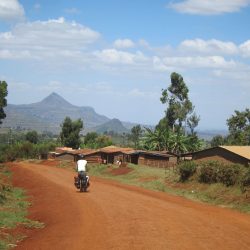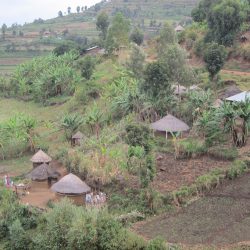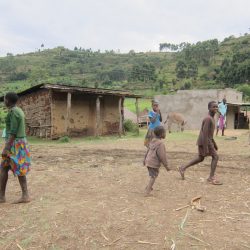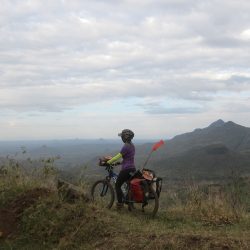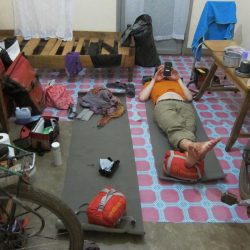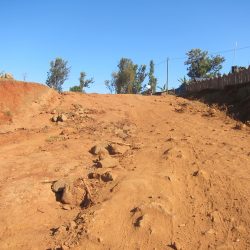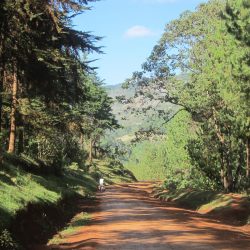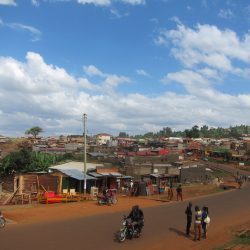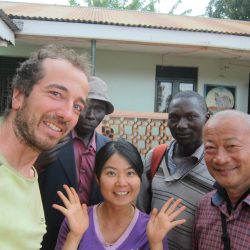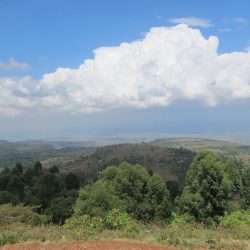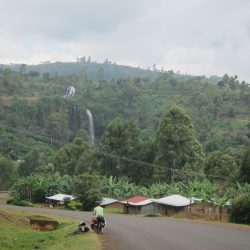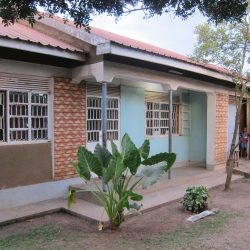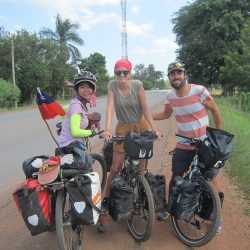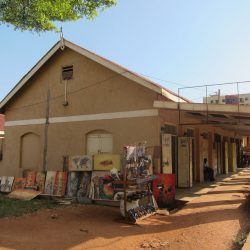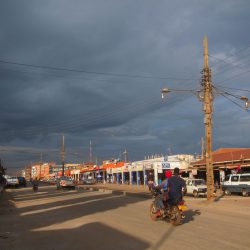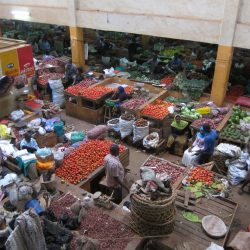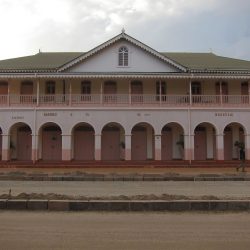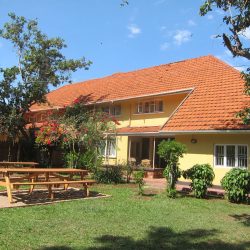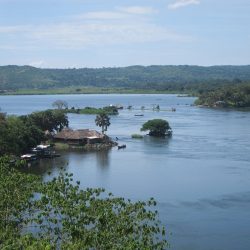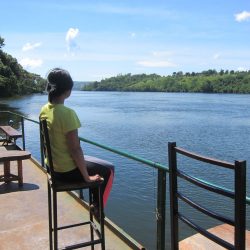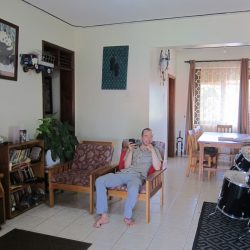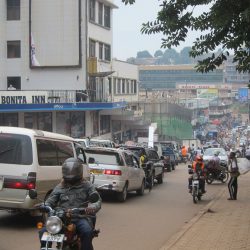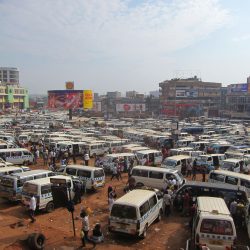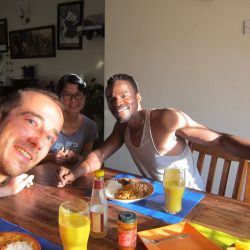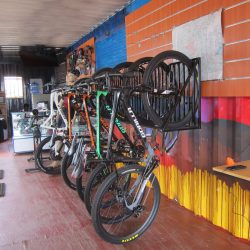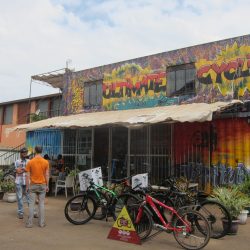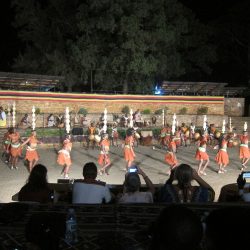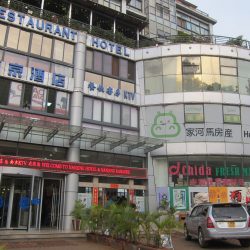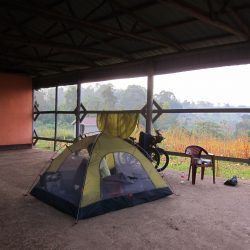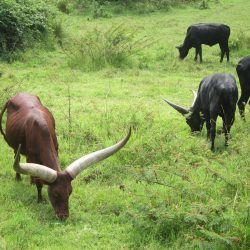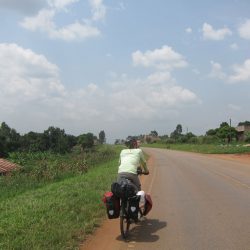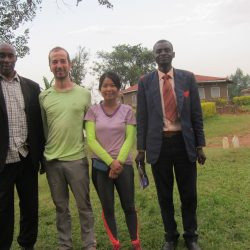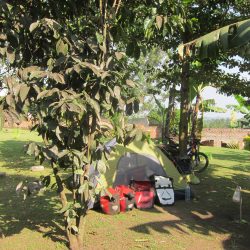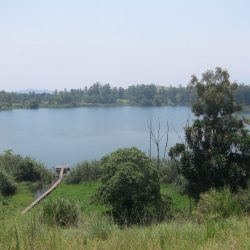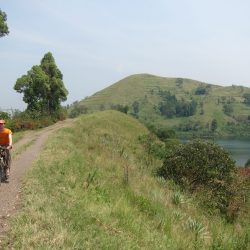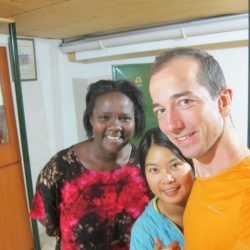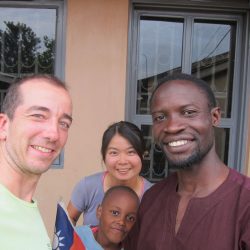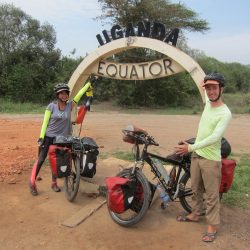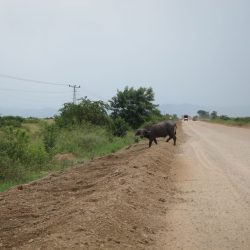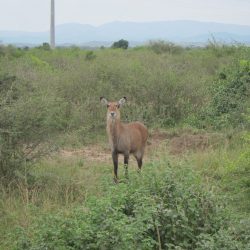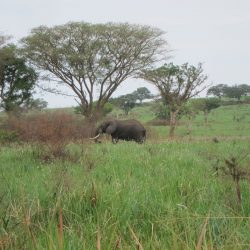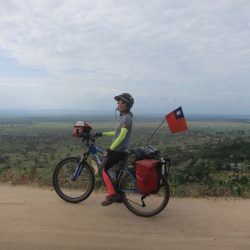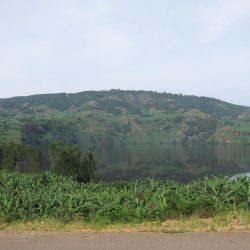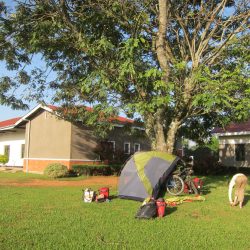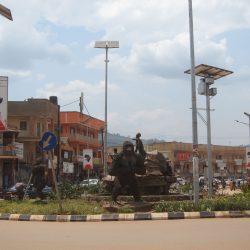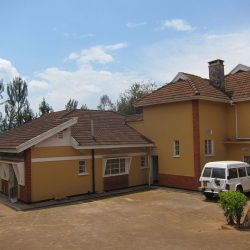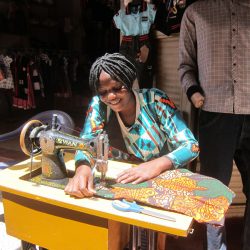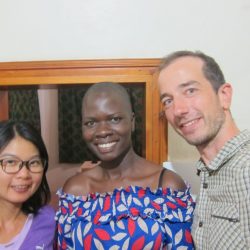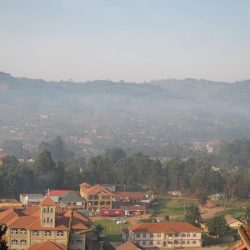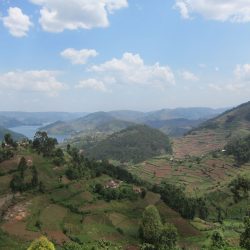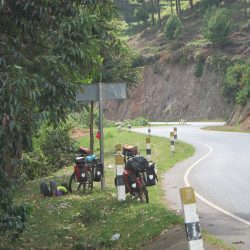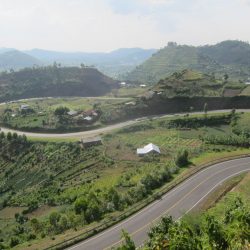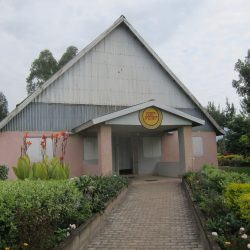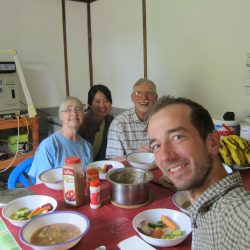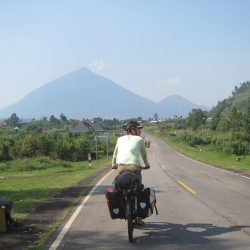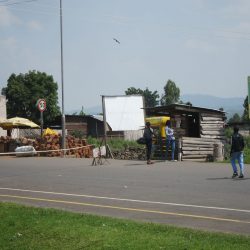Uganda was a country I was looking forward to a lot. Many cyclists and other travelers reported about the beautiful scenery here and the friendly, hospitable people. But after having such a good impression from Kenya, could Uganda beat it?
Mount Elgon Loop
The Suam border on Mt. Elgon is pretty remote. We didn’t really know if there even was a way to get Ugandan Shillings beforehand. The border guard on the Kenyan side asked what happened to my muddy passport, but stamped it nonetheless. No such comments on the Ugandan side, other than a question of how long we plan to stay. We said two months to be safe, and she wrote “02M” above the stamp. They also had no problems to stamp Yuilys Taiwanese passport. We shouldn’t have any time pressure now.
There was indeed no place to withdraw money or exchange Euros, and all we could buy with Kenyan money were a couple of drinks. We went on a hill to get the last bit of excellent Kenyan reception to make a post. Meanwhile, a teenage boy came up and asked for some money. It happened occasionally before, but he spoke decent English, so I asked him why. He didn’t give a straight answer. We, and this was true, didn’t have any anyway. When I proceed to eat some bread, he asked if he can have some, too. I said sorry, I would need it for cycling since I didn’t know when we could restock. I then took a sip of water, for which he then asked, too. That snapped a fuse in me. We were still in the middle of a village, lots of houses and people around. Why, in god’s name, if he was thirsty, did he ask me and not them? He then even proudly said that he knew a spring nearby. This made me even more furious and I insisted that he tells me why he asked me then. He eventually admitted that it was because I’m white. I told him “So you’re a racist”. He left, muttering “No I’m not…”, visibly feeling bad. I was a bit harsh, but regret nothing. Demanding handouts from foreigners is terrible and needs to stop, and hopefully he will not ask the next foreigner.
We left for the next sizable town in hopes of finding an ATM there. There was one marked on Google Maps, but it was nowhere to be found. A couple of locals confirmed that there was none and that we would have to get to Kapchorwa, around 60 km away on horribly bumpy, steep dirt roads. We considered our supplies, and reckoned that we could make it, cooking spaghetti for dinner and rationing our bread. We set off to cover some more distance then.
It was painfully slow. While the road was not that bad (it was very bumpy and steep, but at least firm), it was unbelievably dusty. The dust was very sticky and got just about everywhere and soon we were caked in it. Ugandan children also didn’t help. While the majority of them didn’t beg, the sheer excitement they had for us was too much. Coming around any corner, upon the sight of us they would immediately shout incoherently, then chant “Mzungu, Mzungu, Mzungu!” repeatedly. In every village, half a dozen or more would start running after us and sometimes keep up for many kilometres. Often, a delinquent rascal would be among them, repeatedly mocking us with mock-English “Hiyouhowgeeyouyeah” or mock-Chinese “Ching Ching Chang Ching Chong” in order to look cool in front of his friends. It made us loose patience and yell at them a few times. Once, a boy even pretended to swing his machete after me, which I didn’t see, but which made Yuily very angry.
I can only imagine why it is like that in this part of Uganda. This road, the Mt. Elgon loop, has been popular with touring cyclists and recommended for its natural beauty. So I imagine that a few dozen touring cyclists come through here in a year, which is still not much, but just the right amount for children to know and remember the shape of one, and go hysterical once they see one. It was a bit too much for us, so even though it was very beautiful, we don’t recommend this road for now unless you are very patient and understanding with children.
The adults remained friendly though. We got an invitation from a passing motorcyclist, but unfortunately we couldn’t make it back to his village before dark. After asking around and telling people about our money situation, we were directed to the hospital, which let us roll out our mats on the kitchen floor.
- Just after the border
- Traditional housing
- Annoying kids
- Looking down from the mountain
- Sleeping in a hospital kitchen
- Bumpy road
- Mount Elgon National Park
- Kapchorwa
We worked hard through the remaining kilometers of dirt road the next day, dodging more over-enthusiastic children and blessed the asphalt when we got to Kapchorwa. We were down to one slice of bread each, so it couldn’t have come later. After finding an ATM that worked, we treated ourselves to lunch. Seeing a foreign face in the restaurant, we immediately got talking with a Korean investor, who helped us to find a cheap guesthouse for the night and invited us for barbecue at his place the next day. It sounded fantastic.
Unfortunately, it was not meant to be. After arriving at Sipi Falls and awaiting further directions, I got a SMS from his Ugandan associate that they unexpectedly had to go to Kampala on a business trip. We desperately needed to rest more, and enquired prices from lodgings at Sipi Falls. They were a bit expensive, and while camping was possible at most of them, it was the price of a simple room elsewhere. So, we narrowly decided to push on.
I was almost immediately regretting that decision as the road dropped sharply from the cool mountain into the hot and humid plains. But going up again was not an option either, so I was just sorrowing as I cycled. It was suddenly all blown away as we stopped in a town to get something to eat, went into a small shack and spotted a familiar Korean face. What are the chances! They also had a lunch stop on the way to Kampala and were just as happy to see us again. “It was the will of God” his Ugandan associate said and we talked for several more hours, after which they bartered down a guesthouse to just UGX10,000 (about €2.30) for us. Legends!
Central Uganda
The large city of Mbale was just 30 km away. Using the mobile internet to send out a few couchsurfing requests took ages (the network is significantly worse than Kenya’s!), but one got eventually accepted and we happily made our way to Mbale where we stayed at Jacob’s place for three nights over Christmas. Jacob was not there and his nephew let us in, but otherwise was mostly out as well, so we had the place to ourselves. Which we were fine with. The mobile reception was good, so I managed a few calls home to the family for Christmas. WiFi is very rare in Africa so far, so we rely on mobile internet a lot.
- Friendly Korean and Ugandan
- Looking down onto the plains
- Sipi Falls
- Our home for Christmas
Three years back, at the very start of our crossing of Asia in Hong Kong, I met a Ugandan there. His name was Justus and he himself is an enthusiastic cyclist and warmshowers host, working hard for his club Ultimate Cycling Uganda, and he established East Africa’s first bike brand, Gorilla Bikes. I mentioned that I would come to visit once our tour reaches Uganda, and now was the time. He mentioned that we could stay at one of his businesses in Jinja, before he hosts us in his home in Kampala. So, we excitedly made our way to Jinja.
The children quieted down significantly after Mbale and while we still attracted lots of attention, it was back to levels similar to Kenya. The two countries were overall very similar, but we noticed a couple of important differences for us cyclists: English seems to be even more prevalent, with many Ugandans speaking English to each other as a lingua franca. Simple restaurants are much less common, as is tea, so our habit of sitting down with a cup of tea was harder. Much more common are street food stalls selling the ultimate cycling fuel: Rolex. No, we don’t eat overpriced Swiss watches. It’s a combination of the words roll and eggs, and consists of an omelette rolled in a chapati, often with onions, cabbage and tomato inside. Costing normally UGX1500 (about €0.35), two of them would keep me fueled for the rest of the day.
Coming into Jinja, we noticed that it was different from most cities in Africa so far. Many buildings were from the colonial period, as Jinja was a common residence for the British. The number of tourists we saw was also much more than in any other place, and consequently we were left in relative anonymity, no shouts of “Mzungu” coming after us. With all the tourists came the relevant infrastructure. Souvenir shops, art galleries, tour offices, fancy restaurants. We were also handed a flyer for a pizza delivery service when I realized that such a thing could only exist where there are western tourists.
All this was for a good reason, as the famous river Nile flows out of Lake Victoria here. This happens in a beautiful natural jungle setting that is fun to explore. It gets labeled as “The Source of the Nile”, which is technically not correct since the longest feeder river into Lake Victoria has its source in Rwanda. But Jinja is the first place where the river is officially called Nile, so I can’t blame them for making that advertisement. The place that Justus arranged to host us in was also great: Essentially a hostel, he was planning to convert it into Uganda’s first Bed & Bike accommodation. It’s a big and comfortable place with a big common area and outside lawn. This lawn is used to host touring cyclists via warmshowers.org. Fantastic.
- Cyclist encounter: France
- Jinja art
- Jinja city
- Jinja market
- Jinja colonial architecture
- The Cycling Uganda Hostel
- The “Source of the Nile”
- Up close from a bar
Resting out in Kampala
After enjoying that place, we made our way to the capital, Kampala. We chose to cycle the 80 km on the main road, as I thought there are no paved alternatives (turns out I was wrong and a road further south is completely sealed by now). It was busy, but we had a shoulder most of the time, so we survived. Kampala is known for its notorious traffic jams and we were happy that Justus lives on the east side of the city, so we didn’t need to cross it. He was away in the UK for Christmas and New Years, but continued hosting, as a Belgian cyclist was also there, let us in and showed us around.
As it was New Year’s Eve, some people came over and we prepared dinner for everyone. They later drove off to see the fireworks, while we stayed to watch them from the balcony as we were tired from the cycling.
Justus’ flat was a great place to be and relax. It had a well-equiped kitchen, a washing machine, a fan in our room and (limited) WiFi. We stayed for 18 days in the end, well past Justus’ return. He is a fantastic, inspirational person full of ideas, running a few successful businesses, including Uganda’s only high quality bike shop. We had many talks about different subjects and it was really interesting to hear a well-traveled and wealthy Ugandans take on the country and Africa as a whole.
In short, he mentioned and we agreed that leadership is a big issue. A leader, may it be a village chief, company boss or president, often assumes self-enrichment before responsibility. Becoming a leader in any hierarchy is almost never viewed as a position full of hard work and difficult decisions, but as one where you turn from the one serving to the one being served. Even by the general society, a selfless, responsible leader that doesn’t enrich himself is sometimes seen as strange – blind obedience by people being another problem.
What we saw in Justus’ workplace environment was encouraging though. Many hard-working Ugandans and foreign expats buzzed around the business complex called “Design Hub Kampala”. There was a lot of energy to make the country a better place and people already confirmed to us that the past 10 years already brought tremendous growth.
- Relaxing
- Kampala traffic
- Kampala minibus station
- Justus!
- Gorilla Bikes
- Ultimate Cycling Uganda shop
- A cultural exhibition
- Chinese supermarket
A reason for me to stay in Kampala for a while was also my credit card, since if there is one thing that could be even more important than a passport while traveling, it is the access to money. After losing my wallet and credit card in Mombasa, I had a replacement sent out to the German Embassy in Kampala, Uganda. Unfortunately, the embassy claims to have never gotten it.
So far we had been using Yuily’s card, even though it had much higher withdrawal fees. But here in Uganda, it seemed like no ATM wanted to accept it. The ATMs claimed the bank refused the transaction, the bank said they didn’t notice any failed withdrawals, either way, it didn’t work.
Our third backup was a 200 Euro note. We’ve already seen many exchange offices around, so it would be no problem to get it exchanged, right? Well, the note had water stains that were very visible under UV light, which came from my involuntary mud bath in Kenya. No exchange office or bank would take it.
We almost lost hope and didn’t know what to do. We decided to go back to our hosts place and I thought of contacting some expats that I could transfer money to get cash. Yuily decided to try and pay some groceries at the supermarket using credit card, when I tried a last exchange office there.
Unexpectedly, the lady working there accepted the note without complaints and handed me Ugandan Shillings!
We were very relieved for now. This was very much a triple backup failure, and apart from being more careful with my wallet there is little we could’ve done to prevent it. We just found out just how important access to money while traveling is! I ordered a new card to Ruhengeri in Rwanda, this time using DHL, and hope it arrives!
Into the Wild West
Eventually, the time came to leave Kampala. We still had a ways to go in Uganda and the time on our East Africa Tourist Visa slowly but surely was closing in. With our eyes set on the western town of Fort Portal, we loaded our bikes and were out of Kampala. It took a while, but soon the shouts of “Mzungu!” reappeared as we moved further away from the city.
We spread the 300 km to Fort Portal out over five days. The landscape was constantly hilly and we were either going up or down. In those five days we also noticed increased begging, which we heard of being more common in western Uganda. Most children were still very lovely though, and I was definitely more annoyed by groups of young men hanging around on motorcycles. They would only shout “Oi!” or “Wei!” (you in Swahili) and hiss like snakes to get us turn our heads. We find this very rude, so we ignore it.
All of those nights we camped. While the first night was uncomplicated at a local house, the following ones proved more tricky. People seemed reluctant and concerned for us, as they felt like they couldn’t absolutely guarantee our safety. At one local home, they were fine with us staying, but were insisting that I go to the police station and register us there. The area didn’t seem that unsafe to us, but the concept of “Invisible Danger” came to my mind. One of the curious onlookers might really think that our panniers are full of money. Another concern perhaps was that the police is not really known for professionalism. In case of an actual theft, they would try to find the nearest scapegoat, which would be our hosts…
The last night before Fort Portal we got lucky and met the local governor on the road, who quickly said that he knows where we can pitch our tent and led us to a field near his office. Interestingly, he questioned me the next morning why Germany isn’t doing as many aid projects in the area as other countries (how should I know?). It’s a bit worrying to realize how dependent on aid money those communities have become. I am just an ignorant tourist, but it does seem that many regional governments in Uganda take this sort of thing for granted.
- Camping one of the nights
- Cow with big horns
- Ugandan Jungle
- The local governor
After arriving in Fort Portal, we spent a further three nights there. Amazingly, there was an active warmshowers host: Immaculate, a lovely lady, is running a small guesthouse and campsite and lets cyclists camp for free. She was great to talk to and we had many conversations about all kinds of things. We also enjoyed exploring the area around Fort Portal, which is a volcanic field, with many crater lakes, of which we picked a nearby one and cycled there. Nice views and nice cycling.
- Camping in Fort Portal
- One of the crater lakes
- Fun cycling
- Our host Immaculate
Fort Portal also marked a turning point: So far, from Mombasa, we cycled generally northwest. But this journey was supposed to go to southern Africa, so here we finally turned our wheels south. We had another great couchsurfing host in Kasese who inspired us a lot. Faruku started up a local NGO called Great Lakes Peace Center, which helps local girls out of poverty by teaching them to start up small businesses. He managed to get an UN award for it in Germany as well.
I’m normally very vary of NGOs. Many of them collect huge amounts of donations, but most of that money disappears into the salaries of the western executives and the expensive western lifestyle that they afford themselves in Africa (often they live in huge villas with several servants and splurge on western food). The projects they do fund then are often nothing but handouts, contributing to the local image that “white man is here to give us free stuff”. The executives often know of this damaging effect, but don’t care, since the goal is not to improve life in Africa, but to make their donors feel that they did something good. Indeed, they can’t be aimed at improving the situation for good: Africa has to stay poor for them to continue their work. Even those NGOs out there that are really committed to make a change often end up doing more bad than good because their western executives often have no idea what Africans really need and don’t know the culture.
Faruku’s project is none of that. He is a local Ugandan from Kasese, so he exactly knows what needs to be done and will not spread the “rich white foreigner” stigma. His office small and humble. He only collects a salary when possible, all his other workers are volunteers. I suspect that a €1 donation to him will affect more than a €10 donation to a western owned NGO.
Annoyance in Southern Uganda
Next up from here was the Queen Elizabeth National Park. I did research that it was indeed allowed to cycle through this park as long as it’s not after dark. If keeping to the main road, it’s also free, so we were excited to see some wildlife. After crossing the Equator in the beginning of the park, we were in it and, while not seeing any wildlife yet, really appreciated it. Uganda is a very crowded country and usually all kinds of shouts followed us from everywhere, while almost all land was cultivated. Not here, and apart from the traffic, we enjoyed the silence and nature. We eventually did see two buffaloes cross the road, a herd of antelopes and, towards the end, a few elephants! Luckily, they weren’t interested in us, as I’ve heard that they sometimes try to charge at cyclists!
At the end of the national park (and the beginning of the shouts again) we were climbing up several hills into another volcanic field. It was getting ridiculously hot the next few days so even though we actually gained altitude, we suffered much more from the heat. Suffer we did also from several roadside beggars, which increased steadily the more we went south. Camping was once again possible more easily though, first at a hospital, then a catholic church (where the priest treated us to dinner and breakfast as well) and finally at a college.
- Faruku
- Going to the Southern Hemisphere
- African Buffalo
- Waterbuck
- Elephant!
- Going up again
- More crater lakes
- Camping at the church
In the town of Kabale I found Harriet on couchsurfing, who was starting to build up a guesthouse in town with her sister. It was such a nice house and we had a lot of fun to hang out with them so that we stayed three nights. Yuily noticed the huge amount of tailors in town, and hired one of them to make some bags for her. In the future, she might market these products in Taiwan! We were close to Rwanda now, but from here I was looking forward to one road, supposed to be one of the most beautiful in Uganda and fully paved: The one to Kisoro. We decided to do those 75 km, including a 2500 m pass, in one day.
- Kabale town
- Harriets future guesthouse
- Yuily getting her bag tailor made
- Our host Harriet
Well, I arrived mostly disappointed and angry. Not because it wasn’t beautiful, but because the people were such a problem. Most children and many adults begged that day. Actually, begging is too nice of a word. When someone runs towards us shouting “Give me my money”, that is not begging, it’s demanding. We lost our patience more than a few times and were really upset at how rude and unwelcoming we were treated. This road is taken by all those rich tourists paying $600 to see some gorillas, so I can imagine that the locals think white people are made of cash. But ironically, those tourists are sheltered from the money demanding zombies in their jeeps while we approachable and slow cycle tourists get the full brunt of it. But still, what confuses us is how utterly shameless they are. It seems that in this region of Uganda, all pride and dignity has gone out of the window and demanding money is a totally natural thing to do. Much of our hope in these people is lost and they will most likely stay poor for the rest of their lives.
A further three nights were spent in a village before Kisoro, as we were hosted by an American Adventist priest named Chick through couchsurfing. His church complex was like an oasis and we could be sure to hear the usual “give me money” once we went outside. We had long talks about this issue, that Chick is also trying to prevent in his preaching. We agreed that there is significant racism in this region, and as far as he knows, a prevalent theme in their education is also that white people are responsible for their poverty. True or not, it is racist thinking for sure. One of Chick’s neighbors is Ugandan and significantly wealthier than him, yet he is never begged at…
- Morning fog
- Lake Buonyoni between the mountains
- Tired Yuily
- Fun road
- Chick’s church
- Chick and Barbara
- The Virunga Volcanoes
- Rwanda border
It was a short hop from here to the border, and we could quickly think back about our experience in Uganda. To be brutally honest, Kenya set the bar a bit high with its hospitality, and in our experience Uganda takes second place. We did meet many very nice Ugandans and will remember them for a long time. The scenery was also not that impressive. Apart from the extreme west and east, it was all the same jungle. Food had a distinct lack of vegetables and was more difficult to find, apart from the fantastic Rolex. It was sad to see what has become of the people in the southwest, and I got an even worse impression just before the border: as I ignored a boy, he hit me on my back with his stick. He immediately ran away as I stopped and shouted after him (most of them are cowards like that), so we confronted some adults nearby. Fortunately, Yuily caught the incident on camera and showed it to them. We sincerely hope it will lead to some afterthoughts.
For now, we were looking forward to Rwanda, although I heard that the begging would be similarly bad…
Previous: Kenya Part 2
